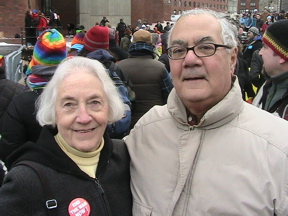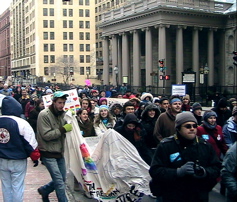I ran across a true story last week, with a plot worthy of a 19th C. novelist. It’s such a good story, I can’t resist writing it down here. (Even though all those concerned with this story are dead, I have changed dates and identifying characteristics anyway — and no, this story has no connection to New Bedford.)
The story begins in 1857, in a small town in northern New Hampshire, when a baby boy is born to a young couple. We’ll call him Albert. Everything is fine until Albert is two and a half, when his parents die, leaving him an orphan. This is a backwoods place, and the only household that can support him is a house of working men; for some reason, they agree to take care of this little toddler. But this is not a fairy tale where cute little Albert reforms these rough, tough men — instead, Albert grows up wild, swearing and cursing from the time he could talk, hearing about the men’s sexual exploits from a young age, having little or no moral guidance (at least, that’s how he remembers it late in life).
When Albert is twelve he becomes friends with a girl three years younger than he. We’ll call the girl China. She lives in a nearby house, and her father is a foul-mouthed drunk, and her older sisters are little better than prostitutes (who knows where the mother disappeared to); in other words, she belongs to the same social class as Albert. Their friendship is the one bright spot in his otherwise miserable childhood. Then they hit adolescence, and before long they start having sex, and by the age of sixteen China is pregnant.
In 1876, society was not tolerant of girls getting pregnant outside of wedlock, and this was especially true for girls living in small New England towns. The townsfolk try to bring legal action against Albert, but under New Hampshire law of that time he is still a legal minor, so they can’t take legal action against him. But they separate China from Albert: he is sent away, and she stays in town and bears the child, a healthy baby boy named Saul. By the time Saul is five, the owner of the town livery stable, a man named Mr. Brewster, marries China and adopts Saul as his own son.
Meanwhile, Albert heads south to Concord, New Hampshire, where he attends school, and eventually winds up studying law with an established lawyer. The lawyer sends him off to Bowdoin, where he doesn’t get a degree, but he does get a year and a half of college. Then he goes back to Concord, New Hampshire, is accepted as a partner in the law firm where he had been working, and almost immediately marries a young woman named Belle who’s from Concord. Before they get married, he tells Belle all about China, and she is broad-minded enough that it doesn’t worry her. They have a child together. When the old lawyer in the law firm dies, Albert decides to try his luck in boston, where he practices law for a time. Then Belle and Albert decide to move to Lowell, and Albert practices law there for a few years before he moves to Somerville.
Thirty-odd years after they marry, Belle dies. While Albert hasn’t been wildly successful as a lawyer, he has done well enough, and over the years he has served with the Massachusetts Bar Association, and has many respectable friends in the Massachusetts legal world. By now, it’s 1925. Albert decides to make a sentimental visit to that little town in northern New Hampshire where he had grown up. He has been gone for nearly half a century now, and he doesn’t expect to find many people whom he remembers, or who remember him; yet whom does he meet but China herself. Mr. Brewster died only eight years after they were married, and she has been single ever since. Albert and China fall in love all over again, and they get married.
Two years after China and Albert marry, a close friend of Albert’s begins to put two and two together. By some freak happenstance, this friend happens to find out when China got married to Mr. Brewster. The friend knows that China and Albert were in love with each other before China married to Mr. Brewster. And this friend knows how old Saul, China’s son, is now. The arithmetic is easy, and the deduction is logical…. Albert realizes his friend has figured out the skeleton of the story. He writes a long letter to his friend, and fleshes out the rest of the story. Albert writes that while he’s thoroughly ashamed of his wild youth, both he and China were victims of their circumstances, they were not immoral but amoral; they are different people now than they were then; and now he is proud of his son Saul, and he is happy, not ashamed, to be married to China. Albert begs his friend to keep this secret, and declares that he would not burden his friend with the story except “I knew when you saw Saul, you figured out that he must have been born before China married Mr. Brewster.”
That’s the end of the story. The friend did keep the secret — at least, he kept the secret until Albert and China and Saul and he had all died. And although I stumbled across this story by pure chance, now I have kept the secret, too; because the real secret is not the story itself — a story that I am sure has happened frequently in the unwritten history of the human race — the real secret is knowing just who the people really were who were the chief characters in the story.


